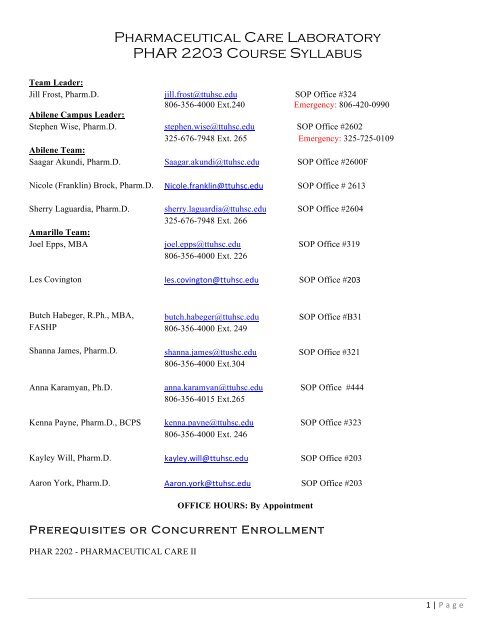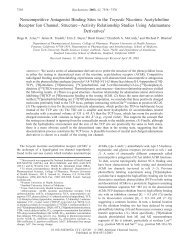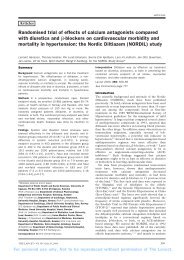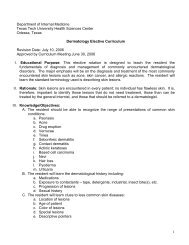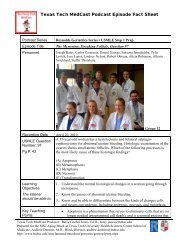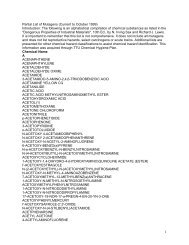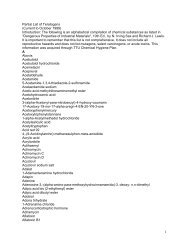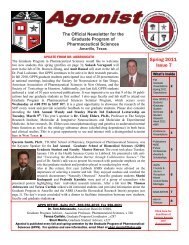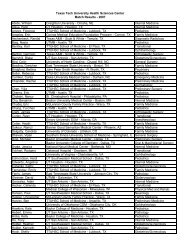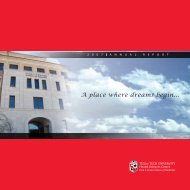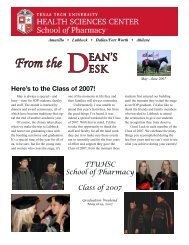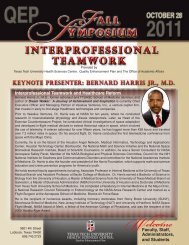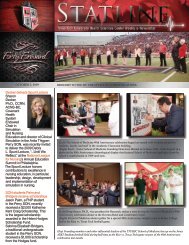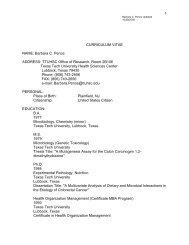PHAR 2204 Pharmaceutical Care Laboratory - Texas Tech ...
PHAR 2204 Pharmaceutical Care Laboratory - Texas Tech ...
PHAR 2204 Pharmaceutical Care Laboratory - Texas Tech ...
You also want an ePaper? Increase the reach of your titles
YUMPU automatically turns print PDFs into web optimized ePapers that Google loves.
<strong>Pharmaceutical</strong> <strong>Care</strong> <strong>Laboratory</strong><br />
<strong>PHAR</strong> 2203 Course Syllabus<br />
Team Leader:<br />
Jill Frost, Pharm.D. jill.frost@ttuhsc.edu SOP Office #324<br />
806-356-4000 Ext.240 Emergency: 806-420-0990<br />
Abilene Campus Leader:<br />
Stephen Wise, Pharm.D. stephen.wise@ttuhsc.edu SOP Office #2602<br />
325-676-7948 Ext. 265 Emergency: 325-725-0109<br />
Abilene Team:<br />
Saagar Akundi, Pharm.D. Saagar.akundi@ttuhsc.edu SOP Office #2600F<br />
Nicole (Franklin) Brock, Pharm.D.<br />
Nicole.franklin@ttuhsc.edu SOP Office # 2613<br />
Sherry Laguardia, Pharm.D. sherry.laguardia@ttuhsc.edu SOP Office #2604<br />
325-676-7948 Ext. 266<br />
Amarillo Team:<br />
Joel Epps, MBA joel.epps@ttuhsc.edu SOP Office #319<br />
806-356-4000 Ext. 226<br />
Les Covington les.covington@ttuhsc.edu SOP Office #203<br />
Butch Habeger, R.Ph., MBA,<br />
FASHP<br />
Shanna James, Pharm.D.<br />
butch.habeger@ttuhsc.edu SOP Office #B31<br />
806-356-4000 Ext. 249<br />
shanna.james@ttushc.edu SOP Office #321<br />
806-356-4000 Ext.304<br />
Anna Karamyan, Ph.D. anna.karamyan@ttuhsc.edu<br />
806-356-4015 Ext.265<br />
SOP Office #444<br />
Kenna Payne, Pharm.D., BCPS kenna.payne@ttuhsc.edu SOP Office #323<br />
806-356-4000 Ext. 246<br />
Kayley Will, Pharm.D. kayley.will@ttuhsc.edu SOP Office #203<br />
Aaron York, Pharm.D. Aaron.york@ttuhsc.edu SOP Office #203<br />
OFFICE HOURS: By Appointment<br />
Prerequisites or Concurrent Enrollment<br />
<strong>PHAR</strong> 2202 - <strong>PHAR</strong>MACEUTICAL CARE II<br />
1 | Page
Course Catalog Description<br />
<strong>Laboratory</strong> exercises focused in community and ambulatory pharmacy practice, including: pharmacy based technology;<br />
counseling and communication; drug knowledge and prospective drug use reviews; prescription dispensing; interviewing<br />
and documentation. One hour lecture and one 3-hour laboratory each week. Levels: Pharmacy-Doctoral Schedule Types:<br />
Lecture, No Credit <strong>Laboratory</strong>, All Sections for this Course Pharmacy Department<br />
Course Mission<br />
Through a series of lectures and laboratory exercises, <strong>PHAR</strong> 2203 will provide the doctoral candidates with<br />
basic skills required to effectively communicate with patients and healthcare practitioners both verbally and in<br />
writing. Basic drug knowledge gained throughout this course is the foundation for candidates to accurately<br />
dispense medications, review medication profiles, and counsel patients according to federal and state laws. This<br />
course will also emphasize critical thinking to solve, document, and communicate common problems<br />
encountered in a community pharmacy or ambulatory care setting.<br />
Course Delivery<br />
Facilities<br />
Campus Activity Schedule Location<br />
Amarillo Lecture Monday 11A-11:50A AMA PAC 1120<br />
Abilene ABI SOP 2300<br />
Amarillo Lab M-Th 2:30P-5:10P; Fri 1:30P-5:10P AMA SOP 209<br />
Abilene M, W 2:30 – 5:10 PM ABI SOP 1120<br />
Textbook/Course Materials<br />
Required (purchase one of the two following options):<br />
1. Sigler’s Prescription Drug Cards 27 th Edition<br />
2. Sigler’s Prescription Drug Cards Update cards (for earlier editions 27 th )<br />
3. Sigler’s Prescription Drug Cards iPhone App<br />
Required Course Materials and <strong>Tech</strong>nology:<br />
Mobile Phone<br />
Laptop with RX30 software<br />
Required (free): TTUHSC Libraries Website Access<br />
Micromedex® Healthcare Online Series<br />
Lexi-comp Online® Database<br />
Recommended (free):<br />
Micromedex iPhone App<br />
Teaching Methods<br />
Course sessions are designed to illustrate the course objectives. <strong>Laboratory</strong> sessions will utilize 77% and<br />
didactic lectures account for 23% of time. Students are expected to come prepared for lab and complete the<br />
necessary worksheet/rubrics prior to lecture or laboratory sessions.<br />
2 | Page
Pre-<strong>Laboratory</strong> Didactic Lecture will include lecture, slides, videos, demonstrations and discussions of<br />
material and activities directly related to laboratory activity content.<br />
<strong>Laboratory</strong> Teaching Methods will include, and are not limited to, hands-on activities with various<br />
medications and drug delivery devices, student presentations, deliberate practice of counseling skills, writing<br />
SOAP notes with direct feedback from faculty and peers, required readings, videotaped communication skills,<br />
interviewing mock patients, performing simulated written and verbal pharmacist interventions with confederate<br />
practitioners, practice of various documentation methods including annotations on prescriptions, drug therapy<br />
problem identification (manually and electronically), basic drug therapy monitoring, basic pharmaceutical<br />
calculations, database management, use of various drug information sources, and medication administration<br />
techniques.<br />
“TOP 200” Drug Knowledge (Sigler’s Prescription Drug Cards or iPhone App) will primarily focus on<br />
drug knowledge of brand/generic, indication, and basic mechanism of action. Cumulative closed book quizzes<br />
will accumulate approximately ~20 additional drugs each week. These cumulative quizzes, self-study with the<br />
cards/app and laboratory activities will help prepare the student for the final closed book cumulative<br />
examination on this basic drug knowledge.<br />
RX30 & Mirixa Databases may be used to create patient medication profiles (PMR), perform drug utilization<br />
reviews (DUR), fill prescriptions, and practicing medication therapy management (MTM). Candidates are<br />
required to use a PC (Windows) computer in the laboratory; computers with operating systems other than<br />
Windows (e.g., Macintosh, Linux, etc.) are not permitted as they do not support RX30 software.<br />
Simulation & Standardized Patients will be utilized within this course. Simple simulation activities may<br />
occur within the laboratory and may include faculty acting as a confederate practitioner to hone a candidate’s<br />
verbal intervention skills. The Amarillo and Abilene Centers for Simulation and Assessment (CSA) will be<br />
utilized. Students may perform interviews with other professions or standardized patients. These interviews may<br />
serve as the basis for a clinical documentation activity in the form of partial or complete SOAP notes.<br />
Mobile Devices (Phones) and Interprofessional Teams (TeamSTEPPS) Students may interact via phone<br />
with each other or with a student of another professional discipline (e.g. nursing or medicine). TeamSTEPPS<br />
“Check-Back” and “SBAR” may be employed and peer-rated during these communications.<br />
Course Objectives<br />
At the end of the course, the Doctor of Pharmacy Candidate is expected to:<br />
1. Recall, comprehend, interpret, apply, analyze, synthesize, and evaluate drug knowledge specific to<br />
community care and ambulatory care pharmacy practices. (A01, A06, A07, A12, A13, A14, A22, A39,<br />
A45)<br />
2. Demonstrate how to implement best practices when utilizing and interpreting federal and state<br />
regulations while dispensing and counseling patients on prescription medications. (A08, A10, A12, A13,<br />
A14, A15, A16, A18, A21, A22, A23, A39, A40, A41, A42, A43, A44, A45, A46, A47, A51)<br />
3. Obtain and effectively document relevant patient specific information within various community<br />
pharmacy or ambulatory pharmacy practice interview scenarios. (A01, A02, A15, A16, A23, A40, A41,<br />
A44, A46, A47)<br />
4. Effectively formulate a written patient care plan in the SOAP note format based on an ambulatory<br />
pharmacy practice scenario. (A07, A08, A09, A10, A13, A14, A16, A18, A39, A40, A41, A44, A45, A46,<br />
A47)<br />
3 | Page
5. Posture effective and professional communication with patients, peers, colleagues, caregivers, and<br />
healthcare practitioners within all written, verbal and non-verbal interactions. (A39, A40, A41, A42,<br />
A44, A45, A46, A48, A49, A50, A52)<br />
Drug Classes Covered in this Course<br />
• Top 200 Medication List will cover BRAND NAME, GENERIC NAME, INDICATION & MOA<br />
(mechanism of action – basic).<br />
o Adverse drug reaction, disease contraindications for the drug, clinical laboratory monitoring,<br />
pharmacokinetics and pharmacodynamics, drug-drug/or drug/food interactions, and counseling<br />
points will be integrated into the context of specific lab activities, but not assessed in drug<br />
knowledge quizzes or midterm and final exams.<br />
Antitussives Upper Respiratory<br />
Agents<br />
Cardiovascular<br />
Agents<br />
Antihypertentives<br />
Antianginals<br />
Sigler’s Drug Class Categories<br />
Antiasthmatics Gastointestinal<br />
Agents<br />
Antiarrythmics Anti-Infectives Penicillins<br />
Cephalosporins<br />
Antiulcer Agents GI Anticholinergics<br />
Macrolides<br />
Tetracyclines<br />
Flouroquinolones<br />
Hormone and<br />
Electrolyte Agents<br />
CNS Agents Antidepressants Antipsychotics Antidiabetics Estrogens<br />
Oral Contraceptives<br />
Analgesic Narcotic Analgesics Nonsteroidal Topical Agents Anti-anxiety Agents Miscellaneous Agents<br />
Antiinflamatory<br />
Antiinflammatory<br />
Agents<br />
Agents<br />
• Counseling Drugs covered in this course will focus on medications with alternate routes of administration or<br />
with specific drug delivery systems (e.g. patches ophthalmics, inhalers, suppositories, injectable, etc.) The<br />
following drug list will be assessed for counseling as per the TTUHSC standardized counseling rubric.<br />
Actonel<br />
Weekly Tablet<br />
Advair Diskus<br />
Amoxicillin<br />
Suspension<br />
Lantus Solostar<br />
Course Expectations<br />
Lidoderm<br />
Patches<br />
Nasacort AQ<br />
Pre-<strong>Laboratory</strong> Preparation<br />
Counseling Drugs<br />
Lovenox<br />
Injectable<br />
Nuvaring<br />
NTG<br />
Sublingual Tablet<br />
Ortho Evra Patch<br />
Pataday<br />
Ophthalmic Gtts<br />
Spiriva<br />
Handihaler<br />
Promethazine<br />
Suppository<br />
Xopenex MDI<br />
Attendance to pre-laboratory lecture is required so the student will be adequately prepared for laboratory session activities<br />
for the week. Rubrics and worksheets may be reviewed where answers and demonstrations may be provided and<br />
discussed in detail. Designated portions of the worksheet and rubrics are required to be completed in order to be admitted<br />
to the laboratory session for the week. Students with incomplete rubrics or worksheets will not be admitted to the<br />
laboratory and will incur a tardy (1% deduction) from the final course grade for each occurrence.<br />
Missed <strong>Laboratory</strong> Policy<br />
4 | Page
Attendance to laboratory sessions is required. Candidates are required to attend the laboratory session for which<br />
they have enrolled. Students are required to be on time, professional and engaged in the laboratory activities<br />
and complete coursework in order to receive full credit for the session. Laboratories will not be made up.<br />
Per the TTUHSC-SOP Student Handbook: Code of Professional and Academic Misconduct, a student who<br />
fails to attend any class (for any reason) is responsible for the material presented in class, assignments,<br />
examinations, announcements, etc. to the same extent as though the student had attended the class.<br />
Legitimate reasons for missing a laboratory may include death in the family, family emergency (TTUHSC OP<br />
70.01), catastrophic accident, or acute illness. Documentation will be required, and the candidate must attend an<br />
alternate lab during that week. If the absence occurs on the last day of the laboratory week for that campus the<br />
lab assignment may be completed within the timeframe as defined by the team. Circumstances affecting the<br />
acute attendance of an entire lab session (e.g. school closure, campus closure, etc.) will be dealt with based on<br />
the most current TTUHSC policies and procedures and logistics as identified by the course team.<br />
Unexcused laboratories will result in a 5 point deduction from the final course grade. A missed laboratory<br />
deduction may occur if a candidate is ≥ 30 minutes late to the session for two occasions with no documentation,<br />
refusal to participate in any part of the laboratory session, leaving the classroom prior to dismissal, or being<br />
excused for professional or academic misconduct.<br />
Alternate lab day requests must be submitted to the team leader or campus leader prior to the first day of the<br />
laboratory week; documentation will be required. In general, one lab switch may be permitted per candidate per<br />
semester. In the event that another lab session is full, it is the responsibility of the student seeking the lab<br />
change to identify a student who is willing to switch lab days. Professional leave request should be submitted<br />
according to the TTUHSC-SOP professional leave policy. Work, travel, examinations or other coursework are<br />
not valid excuses for requesting an alternate lab day. The team reserves the right to approve or deny requests.<br />
Appropriate <strong>Laboratory</strong> Attire<br />
Guidelines for appropriate professional attire are defined for the candidate within the TTUHSC-SOP<br />
Professional Conduct Code .<br />
Candidates are required to don: 1) professional attire; 2) a clean-pressed <strong>Texas</strong> <strong>Tech</strong> School of Pharmacy<br />
laboratory coat; and 3) <strong>Texas</strong> <strong>Tech</strong> nametag to all laboratory sessions, standardized patient interviews, and<br />
counseling assessments. Scrubs are not appropriate attire for this laboratory. A 2.5 point deduction from the final<br />
course grade will result for each occurrence in the laboratory. A 5 point deduction from the final course grade will result if<br />
during an SP interview or counseling assessment.<br />
Professional & Ethical Standards in the <strong>Laboratory</strong><br />
Candidates are expected to respect the learning environment and exhibit ethical academic and professional<br />
behavior at all times.<br />
Appropriate Use of <strong>Tech</strong>nology: The use of the internet, databases (RX30 and Mirixa), personal mobile devices, and<br />
earphones must be consistent with course activities. Texting, calling, streaming audio or video files, surfing the internet,<br />
or abusing the database profiles for non-course related activities during laboratory sessions is prohibited.<br />
Eating and drinking in the laboratory is prohibited. Candidates are not permitted to eat or drink food within the<br />
laboratory.<br />
5 | Page
Students must follow the guidelines within the TTUHSC-SOP Professional Conduct Code , TTUHSC-SOP<br />
Student Handbook: Code of Professional and Academic Misconduct , TTUHSC-SOP (<strong>PHAR</strong> 2203)<br />
Instructions for (Written/WebCT) Major Assessments (page 11) or TTUHSC-SOP (<strong>PHAR</strong> 2203) Instructions<br />
for (<strong>Laboratory</strong>) Major Assessments (page 12).<br />
Failure to follow these standards may be considered professional and/or academic misconduct, and may result<br />
in dismissal from the classroom, laboratory, or assessment with the corresponding point deduction (5 points)<br />
and up to a zero (0) in the course for academic misconduct. Misconduct will be documented with the Office of<br />
Student Services.<br />
Course Grading<br />
Assessment Methods<br />
<strong>Laboratory</strong> Counseling Exams: Students will be scheduled for 15 minute blocks for counseling and should<br />
arrive at least 10 minutes prior to scheduled time.<br />
Standardized Patient (SP) Interview: Students will be scheduled for ~15 minute block to interview an SP and<br />
collect information on a provided data sheet. Students should arrive at least 10 minutes prior to scheduled time.<br />
The interview and corresponding SOAP note are individual assignments.<br />
Sigler’s Cumulative Prescription Drug Quizzes: Occur approximately every week with approximately 20 new drugs<br />
added each week.<br />
WebCT Midterm and Final Examination: 120 questions, closed book based on Sigler’s drug list. Midterm will be<br />
cumulative to that point of material covered in the course. Final will be cumulative.<br />
ASSESSMENT SCHEDULE<br />
Exam Other Date<br />
Mon 10/1 2:30 –TBA<br />
Location<br />
Mid-term<br />
Tues 10/2 2:30 –TBA AMA CSA<br />
<strong>Laboratory</strong><br />
Counseling Exam<br />
Wed 10/3 2:30 – TBA<br />
Thu 10/4 2:30 – TBA<br />
Fri 10/5 2:30 – TBA<br />
ABI CSA<br />
WebCT Midterm<br />
Exam (Cumulative)<br />
EXAM BLOCK Wed 10/17 @ 8:30-10:00AM<br />
AMA 1120<br />
ABI 2300<br />
SP Interview & Standardized Patient Interview<br />
Mon 11/12 2:30 -TBA AMA CSA<br />
SOAP<br />
***<br />
DATA sheets returned to students ABI CSA<br />
Students Turn In Data Sheets<br />
Wednesday 11/14<br />
Immediately after Interview SOAP DUE Wed 11/21 @ 11:59PM<br />
Mon 12/3 2:30 –TBA<br />
Final <strong>Laboratory</strong><br />
Tues 12/4 2:30 –TBA<br />
Counseling Exam<br />
(15 Minutes per 2 students)<br />
Wed 12/5 12:30 – TBA<br />
Thu 12/6 2:30 –TBA<br />
Fri 12/7 2:30 –TBA<br />
AMA CSA<br />
ABI CSA<br />
WebCT Final<br />
Exam (Cumulative)<br />
EXAM BLOCK Thurs 12/13 @ 8:30-10:00AM<br />
AMA 1120<br />
ABI 2300<br />
6 | Page
GRADING SCHEME<br />
% of Total Grade Item<br />
10% 14 Sigler’s Drug Knowledge Cumulative Quizzes<br />
15% Midterm (Cumulative) WebCT Exam<br />
20%* Counseling Mid-term Practical Lab<br />
20%* Counseling Final Practical Lab<br />
15%* Interview & SOAP Note<br />
20%* Final (Cumulative) WebCT Exam<br />
*Laboratories are worth 5% per session. <strong>Laboratory</strong> preparation is worth 1% per session.<br />
Course Examination Policies<br />
Excused Absences<br />
*Major Assessments.<br />
Pertaining to TTUHSC OP 77.11, it is the responsibility of the student to exhaust all possible means of contact<br />
as soon as possible if an absence from an examination might occur. Regardless of the method(s) of<br />
communication employed, a student must obtain a response from faculty on the course team before assuming<br />
that their absence is acknowledged and therefore excused. Documentation is required for any absence and all<br />
documentation should be provided as soon as possible after the student’s return. If documentation is not<br />
feasible, the student will sign an affidavit stating the reasoning for his/her absence. If a student makes a claim<br />
for an excused absence that is determined to be untrue, then it becomes an issue of academic misconduct which<br />
may result in a zero (0) for the course. No points can be awarded for an assessment that was not performed. A<br />
grade of 0 for the assessment will be assessed for all unexcused absences.<br />
Late to WebCT (Written) Assessment<br />
It is at the discretion of the course team as to whether a penalty is assigned as a consequence for late arrival to a<br />
WebCT (written) assessment. No time extensions will be provided for an assessment for a student who arrives<br />
late. Candidates arriving after the first student has left the classroom must meet the criteria for excused absence<br />
or will otherwise not be admitted into the assessment and incur a zero (0) for the assessment.<br />
Accommodations for Excused Absences:<br />
An examination can only be made up with the approval of the course team. Make-up examinations may differ<br />
from the original activity. The faculty team will make accommodations within a reasonable timeframe to<br />
provide an alternate or make up assessment for excused absences. No point deduction or penalty will be<br />
assessed for excused absences. Make-up assessments are not required to be the same format as the scheduled<br />
assessment and the make-up format will be at the discretion of the course team. The time of the make-up<br />
assessment will also be at the discretion of the course team.<br />
Late to <strong>Laboratory</strong> Assessment<br />
Arriving to a laboratory counseling practicum or SP interview after the scheduled time block for the candidate<br />
has ended and will be considered a missed practicum which will result in a zero (0) for the activity.<br />
A candidate will be considered late if arriving after his/her scheduled time block begins and before it ends.<br />
Candidates may be fit-into the laboratory assessment schedule at the discretion of the faculty proctoring the<br />
assessment. For counseling practicums, the full time will be allowed for a late candidate and partner. The<br />
7 | Page
maximum attainable score for the late candidate will be 70% for all remaining attempts. Candidates arriving late<br />
to a standardized patient (SP) interview will only receive the remaining time in their scheduled block to perform<br />
the interview. Cases may be reviewed using the same guidelines outlined by the missed examination policy<br />
(page 6).<br />
Candidate Inquiries<br />
Emergency contact numbers for Drs. Frost and Wise are provided to students as the preferred method of<br />
communication with the team in the event of an urgent or emergency situation. Please reserve the use of<br />
emergency contact numbers for these circumstances.<br />
For general inquiries, email is the preferred method of communication. The teaching team welcomes questions<br />
from students, and responses are typically given within 2 business days. If there are questions or concepts that<br />
require further explanation, candidates may schedule an appointment with the instructor who taught the<br />
material.<br />
Reasonable Accommodations for Candidate Disability<br />
Candidates seeking reasonable accommodations must follow the TTUHSC-SOP OP 77.P.21.<br />
It is the responsibility of the candidate to meet with either Dr. Frost (Amarillo) or Dr. Wise (Abilene) during the<br />
first week of class (or as soon as possible for later diagnosis) to present and review the candidate’s “Letter of<br />
Accommodation” (LOA) and contract. After obtaining the LOA, the course team faculty will notify the Office<br />
of the Regional Dean, Logan Larue (Amarillo) or Melissa Edwards (Abilene) of the LOA, contract, and testing<br />
schedule by the end of the first week of classes or as soon as possible. Once the Office of the Regional Dean has<br />
the proper documentation, they will begin making reasonable accommodations applicable to the candidate and<br />
course.<br />
No requirement exists that accommodations be made prior to completion of this approved university process.<br />
Second Chance Policy<br />
The Second Chance Policy applies to all courses except case studies and clerkships. A doctor of pharmacy<br />
student, if eligible, may take a single comprehensive examination to demonstrate competency in that course<br />
providing that:<br />
• The student has passed 50% or more of the major assessments in that course<br />
• The student has earned a final grade of 66-69% in the course, and<br />
• The student has not exceeded the number of second chance attempts as outlined below.<br />
A student may invoke the Second Chance Policy in a maximum of two courses per semester, and no more than<br />
four times total in his/her career at the School. No student may invoke the second chance exam for the same<br />
course twice. The second chance assessment shall occur in a timely fashion, the timing at the discretion of the<br />
course team.<br />
8 | Page
Week Topic Pre-‐Lab<br />
Top 200 to Cover Counseling<br />
Lecture<br />
Drug Rubrics<br />
1<br />
8/13 Course Introduction<br />
Syllabus, RX30, RX<br />
Entry, PMR, DUR<br />
Frost/James Antiarrythmics/ Antihypertensive<br />
DRUG KNOWLEDGE<br />
RUBRIC for LAB:<br />
Lidoderm Patches<br />
Actonel<br />
2<br />
8/20 Communication<br />
3<br />
8/27 Counseling<br />
4<br />
9/3<br />
5<br />
9/10<br />
6<br />
9/17<br />
7<br />
9/24<br />
8<br />
10/1<br />
9<br />
10/8<br />
10<br />
10/15<br />
Labor Day<br />
Counseling & ISMP<br />
Med Safety<br />
Interviewing<br />
Med History<br />
Documentation<br />
Intro / Midterm<br />
Prep<br />
8 Weeks Exam Block<br />
No Class<br />
Documentation<br />
MTM/Targeted<br />
Notes<br />
Documentation<br />
SOAP<br />
10/17 Written Midterm<br />
@8:30 AM<br />
11 Documentation<br />
10/22 MTM/Targeted<br />
Notes<br />
12<br />
10/29<br />
13<br />
11/5<br />
Documentation<br />
S & O<br />
Documentation<br />
A & P<br />
COURSE LECTURE SCHEDULE WITH DESCRIPTION<br />
Epps/Frost Antianginals/Misc. Cardiovascular<br />
Agents<br />
DRUG KNOWLEDGE<br />
RUBRIC for LAB:<br />
Lovenox Injectable<br />
NTG Sublingual<br />
Lab<br />
Lab Intro; RX30;RX Entry;<br />
PMR;DUR<br />
Dispensing & Law Label<br />
Requirements<br />
Epps/Frost Estrogens/ Contraceptives DRUG KNOWLEDGE<br />
RUBRIC for LAB:<br />
Ortho Evra<br />
Nuvaring<br />
Counseling; Law<br />
No Lecture No Lab<br />
James Antiulcer/Ulcer/GI Anticholinergics<br />
& Antispasmodics/Misc. GI Agents<br />
James Macrolides, Tetracyclines;<br />
Fluoroquinolones; Misc. Anti-‐<br />
Infectives; Penicillins,<br />
Cephalosporins<br />
DRUG KNOWLEDGE<br />
RUBRIC for LAB:<br />
(Phenergan) Rectal<br />
ID (Suspension<br />
tastes lab?)<br />
DRUG KNOWLEDGE<br />
RUBRIC for LAB:<br />
(Amoxicillin<br />
Suspension)<br />
James Antianxiety/ Antidepressant DRUG KNOWLEDGE<br />
RUBRIC for LAB:<br />
(Pataday)<br />
Ophthalmic<br />
(Nasacort AQ) Nasal<br />
Recorded Counseling;<br />
Dispensing; ISMP Med<br />
Safety; Dispensing & Law<br />
Counseling; Dispensing;<br />
Documentation<br />
Interviewing; Counseling;<br />
Dispensing<br />
Frost Antitussives/Misc. Upper Resp Counseling Midterm<br />
No Lecture Take Home Lab –<br />
Mirixa/Wise<br />
Payne Asthma Respiratory<br />
DRUG KNOWLEDGE<br />
RUBRIC for LAB:<br />
Advair, Xopenex<br />
HFA, Spiriva,<br />
Respiratory:<br />
Inhalers, Nebulizers<br />
Grade a SOAP<br />
Counseling; Dispensing;<br />
Drug Knowledge<br />
Wise Topicals MTM<br />
Laguardia Antipsychotics/ Misc. CNS Write S & O<br />
Counseling; Dispensing;<br />
Drug Knowledge<br />
Payne Misc. Analgesics and Anti-‐<br />
Inflammatory; Narcotic Analgesics;<br />
NSAIDS<br />
Write A & P<br />
Chart Review Exercise<br />
9 | Page
Week Topic Pre-‐Lab<br />
Top 200 to Cover Counseling<br />
Lab<br />
Lecture<br />
Drug Rubrics<br />
14 SOAP Review Payne Misc. Hormones/ Electrolytes SP Counseling<br />
11/12 SP Prep<br />
15 Counseling Review Epps Misc. Agents No Lab<br />
11/19 & Special<br />
Populations<br />
Thanksgiving Week<br />
16<br />
Frost Anti-‐Diabetic Agents Endocrine Insulin Lab & Drug<br />
11/26<br />
Drug Knowledge<br />
DRUG KNOWLEDGE<br />
RUBRIC for LAB:<br />
Delivery Devices<br />
Insulin & Injection<br />
(Lantus Solostar)<br />
Injectable Insulin<br />
Mixing<br />
17 Drug Knowledge Frost Counseling Lab Practical<br />
12/3 Review Games<br />
12/13 Written Final<br />
Thursday @8:30<br />
10 | Page


